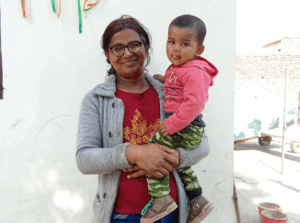Education
And you thought being a Preschool Teacher was Easy Peasy
Anshu Pande lists the challenges, qualities and the enormous rewards of teaching tots
Published
6 years agoon
By
Anshu Pande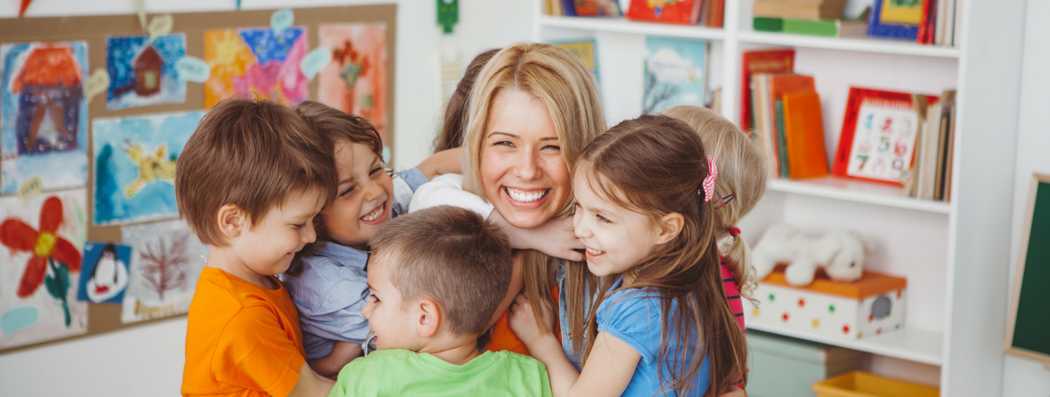
Children begin learning from the time they take birth. The realization as to who are his/her parents, and how to react when one feels hungry, and even every emotional response is structured by observing the surroundings. At the age of 3, parents usually enroll them into a preschool, which aims at early childhood education. Preschool builds the foundation of learning in children. It offers children the chance to socialize with other children, learn more about themselves, learn how to problem solve, build confidence and much more. Childhood education continues to be of high importance to parents, policymakers, and the public. This was seen in 2013, when President Obama asked Congress to expand access to high-quality preschool to every child in the country through his State of the Union speech.
Preschool lays the foundation for kids to understand what “school” actually is. Teachers use a variety of methods to help children grow cognitively, as well as conceptually. A positive relationship with preschool teachers can make an exponential difference in a child’s success as they continue through elementary school. In addition to helping foster growth intellectually, it is just as important to help children grow in their physical abilities. In terms of human development, the importance of early childhood education can’t be overstated. Education gained in this duration, is about honing and molding the holistic child, which will eventually form the basis of their lifelong journey. A child’s early years are the foundation for his or her future development, providing a strong base for lifelong learning and learning abilities, including cognitive and social development. Well-established research continues to emphasize the importance of early childhood education as an essential building block of a child’s future success.
The most important role is played by the teacher. It might look very easy to become a play school teacher and deal with kids. But do you really think it is? Mostly evaluated amongst the list of pretty simple jobs, being a playschool teacher seems to be an easy goal for many people. But looking deep into the reality, it is not something everyone can do. Becoming a playschool teacher is not just about following the routines and taking care of kids. When you get inside a room full of different types of kids, a playschool teacher is given a super teacher dimension altogether.
The world inside a classroom is different from what a kid and the teacher might experience outside with any other person. When a child gets enrolled in a playschool, he or she is expected to enter a world full of strangers by leaving the protective environment at home. Here, the young bud is shown a very different perspective and made to learn the basic mannerism. All this that has to be served to a budding mind comes from a preschool teacher. It takes a core hardship and perfected dealing mechanism for a teacher to deal with a toddler, make him understand things better, groom him in the right direction, and perfecting the behavior for futuristic academic goals. Along with all the responsibilities, there are enormous things that a playschool teacher is expected to take a proper care of, to completely justify the role taken up by them.
Not only this, there is a list of challenges faced by the preschool teacher in the course of following their curriculum and teaching in a playschool. The top three being:
1. Retaining the attention of kids – Each young mind has a different sort of behavior and interests. It is not possible that each and every child in a preschool classroom will be same and pay an equivalent attention to everything that is told by the teacher. Some kids may find the classroom discussions engaging or some may not find it very interesting to invest attention in. So, binding every child in a classroom in a thread becomes difficult for a teacher.
Toddlers being fussy and moody might not be very engaged towards the teacher. It becomes a dare for a playschool teacher to grab and retain the attention of children for long. In a large-sized class, many students will definitely be distracted and even distract others. Keeping a child stick to what is being told in the class or the activities going on needs diverted attention at a single point in time. And this becomes one of the biggest challenges for a playschool teacher.
2. Physical Misbehavior – Young bud is not familiar with a concrete language and is undergoing the development stage of speaking skills. Toddlers, being a bit fussy or notorious differ in their behavior and understanding level in this age. Not so wide understanding level and ability to express things often leads to conflicts between the children which may result in a physical misconduct with each other.
As a preschool teacher, it becomes very important yet difficult to make children understand the good and bad behavior. There might be the incidents of hitting faced by a teacher in the class. So, guiding the children in the right direction for the same is important. A wrongly handled hitting case might lead a child to become very stubborn or naughty and repeat the activity again. Thus, it is a very challenging situation for a teacher to handle this kind of physical misconduct in the playschool premises.
Also, a teacher has to be very sure that other children in the class might not get affected by this or follow the same path. Managing all the things at a single point becomes very confusing and at times frustrates the preschool teacher too.
3. Effective execution of the preschool curriculum – Implementing the playschool curriculum in a class with a lot of distractions and disruptions due to various factors becomes a very difficult task for a playschool toddler. A lot of issues entailing the implementation of curriculum in the different aspects are faced by the preschool teachers. Some of them are listed below.
-
Availability of materialistic facilities: Not all schools are highly equipped for teachers, to provide the go through of the curriculum in a very modern and technical manner. The availability of materialistic facilities becomes very important as the curriculum followed nowadays is technical-centered and emphasis on the use of technology to groom the children rather than bookish content for the young mind. The unavailability of the resources disables the teacher to follow the curriculum in a creative and more profound manner, as suggested by the makers.
-
Planning takes a chunk of time: If a preschool teacher follows the designed curriculum, it may take a huge chunk of time to understand it, make various arrangement for activities quoted, prepare the documentation of the observations of a toddlers learning based on the same and reflect from the activities that are really helping the child. All the formulation done before and after the curriculum takes a lot of time and it becomes difficult for teachers to simultaneously manage everything around from classroom to fussiness of each kid and paperwork. Also, this hectic schedule disables the teacher to implement what and how she has planned the things to be done as per the interest of the kids.
-
Assessment reports are lengthy: Along with the things mentioned in the curriculum, a teacher has to report the progress details and assessments of each and every child. The curriculum already demands most of the time of the preschool teacher, plus the formulation of these reports on qualitative and subjective aspects acts like a cherry on the cake for a teacher. Whether a preschool teacher likes it or not, she’ll have to do up with it anyhow. This assessment process makes it challenging for teachers to work and is very time-consuming.
If you see, even in the case of difficulties, the preschool teachers manage to work so efficiently to direct the future of toddlers in a right manner. Without any mistake or distractions, the playschool teachers are devoted towards their duty and handle the most important and crucial age of every human being.
This is no secret that working with children can be incredibly fun and that is why teaching is considered to be an exceptionally rewarding career. The enthusiasm that children bring with them is infectious, making the job a lot more pleasant. There is a sense of pride knowing you've nurtured the development of a child in the most important learning years of their life. Other than a formal education in the field, a good preschool teacher requires certain traits which will help excel at their jobs:
Patience: Children can sometimes be loud, stubborn, emotional and irrational; where the patience of the teacher comes to play. A teacher should have the ability to understand the child's mood swings and patiently engage him/her into learning. One might even have to teach children in different ways for them to understand a concept. Interestingly, patience also comes handy for teachers to deal with the incessant queries and concerns parents have about their child.
Creativity: Children can be easily distracted; hence the teacher needs to be very creative. He/She should have the ability to come up with new and innovative techniques to teach children so as to grab their attention and keep them engaged at all times. Children have different skills of learning – some are attentive while some understand better through visuals or through activities. So as a guru, one needs to employ a variety of techniques to ensure seamless flow of learning.
Classroom Management: Managing a classroom can be very challenging. A teacher should be able to control children, but at the same time she/he should not scare them. It is important for a teacher to strike a balance between being firm but at the same time have warmth around his/her personality. Creating a welcoming, engaging environment in which the children can learn while playing is essential.
Communication Skills: The teacher should have good communication skills. It is very important for her to communicate difficult concepts to children in a way they understand. Teachers can incorporate lessons through songs, rhymes, role play, etc. Communication skills can also help her record and communicate the growth of the children to their parents as well as other teachers. More importantly a pre-school teacher should be an active listener and should be able to gauge the body language of children to understand their thoughts and emotional condition. This is paramount.
Flexibility – You can everything planned out for each lesson, but great preschool teachers know that unexpected turns can happen at any time. When you remain flexible to deal with change, you can handle almost anything. This could include something as simple as having an alternative plan for rainy days or more drastic like adjusting your entire curriculum to accommodate for a reduced budget. Even the very nature of teaching young children requires constant fine tuning and dealing with minor issues. By staying flexible, you can tackle every kind of educational challenge with poise and grace.
Dedication: Great preschool teachers are dedicated to their students and their career. When you are determined to stand up for your beliefs on behalf of your educational values or your students’ needs, you will gain respect from your colleagues, parents and students. Moreover, excellent educators are dedicated to the love of learning and inspire their students to learn more. At the preschool level, making the classroom a place where learning is fun can resonate with children for the rest of their lives. Most of all, truly successful teachers are dedicated to bring out the best in their students.
Qualifications: The educational qualifications vary from state to state. A background in education is essential, and a good candidate for a preschool teaching position will have taken higher education classes in the fields of psychology, child development, education, classroom management, and curriculum. Many university courses also require aspiring teachers to gain some hands-on experience volunteering in a classroom, day care centre or other similar environment.
There are ample opportunities for preschool teachers who have undergone training in pre-primary education or have a diploma in early childhood care. To serve the growing demand for trained preschool teachers there are many courses certified by the government and private institutions, with respect to the same, the fees for which ranges from Rs.40, 000- Rs.65, 000. Remuneration can vary from 1,50,000- 3,00,000.
In the end, I would like to leave you with a beautiful quote by Vicki Zakrzewski “Helping students find a path to purpose is one of the noblest aspects of teaching.”
You may like
-


Less Than Half of Indian Schools Offer Skill-Based Courses for Senior Students: NCERT Survey
-


The Woman Who Refused to Disappear – Aditi Sharma’s Quiet Fight for Education
-
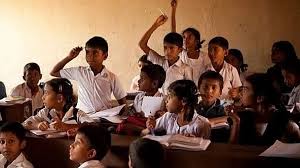

UP Govt Launches Astro Labs in Government Schools to Boost Scientific Learning
-
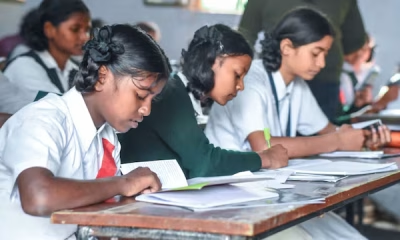

Class 3 Learning Levels Show Gains Since Pandemic, But Still Below 2017: PARAKH Survey
-
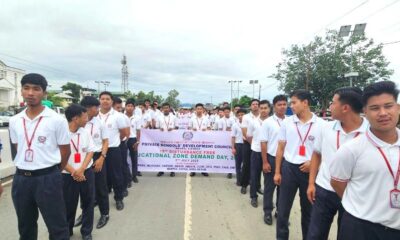

Manipur Rallies Call for Disruption-Free Education Amid Ongoing Unrest
-
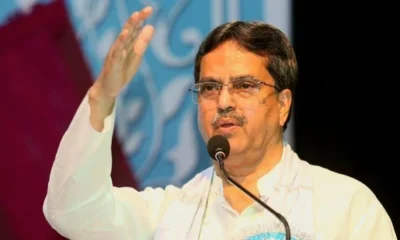

Tripura CM Launches School Framework, Stresses Social Work in Education
-
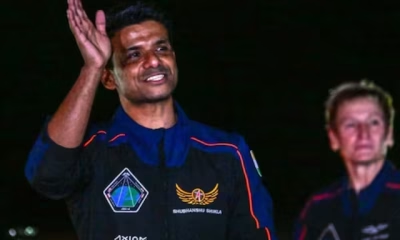

“We Sleep on Walls Here”: Shubhanshu Shukla Talks to Indian Students from Space
-


A Structural Proposal to Transform School Education in Bihar
-


NIIT Foundation and YuWaah, UNICEF Launch Free Online Digital Marketing Course for Youth
-
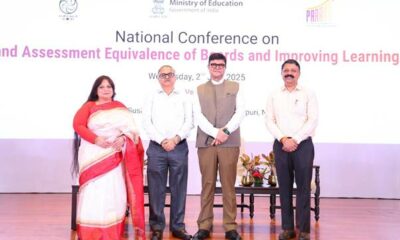

National Conference Pushes for Common Standards Across School Boards
Education
Less Than Half of Indian Schools Offer Skill-Based Courses for Senior Students: NCERT Survey
Published
12 hours agoon
July 10, 2025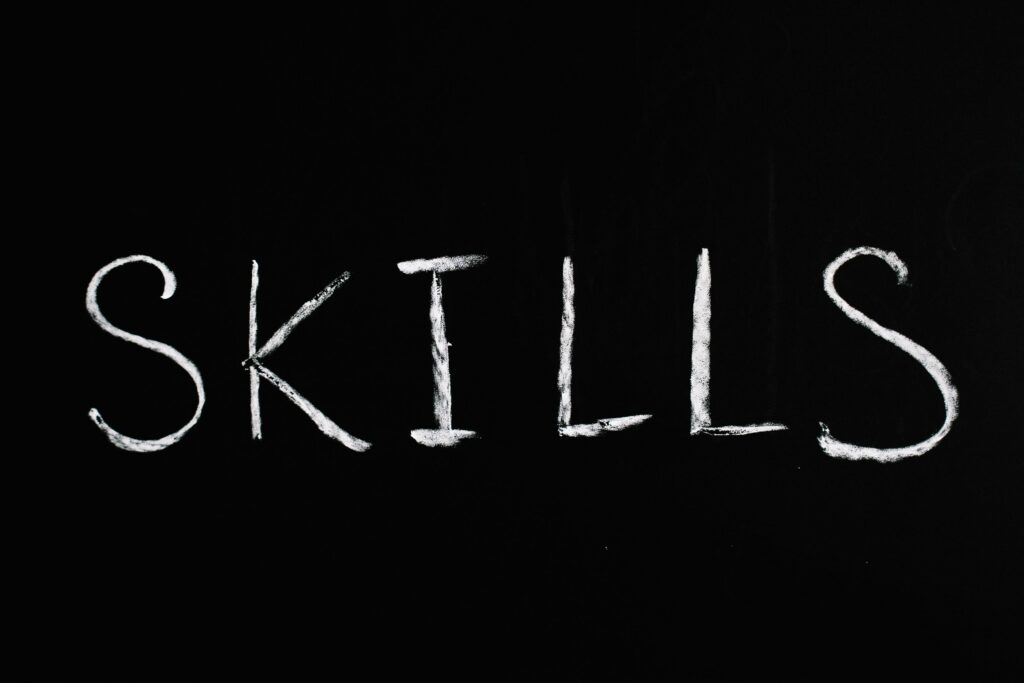
A recent survey conducted by NCERT’s National Assessment Centre has revealed that only 47% of schools across India currently offer any skill-based courses to students in Class 9 and above. This statistic highlights a significant gap in the availability of practical, job-ready education at the secondary level—an area that India’s New Education Policy has been aiming to strengthen.
The survey also found that student enrolment in these courses is even lower. Just 29% of students in Classes 9 and above have opted for skill-based subjects, indicating the need for better awareness, guidance, and integration of these programmes into mainstream learning.
The courses that are being offered include trending and industry-relevant subjects like Artificial Intelligence, Data Analytics, Digital Marketing, and E-commerce. However, experts believe these numbers are far from adequate in a country with one of the world’s largest youth populations.
At the higher education level, there is a stronger push for integrating skills into curricula. Many skill universities now structure their programmes with a 60% to 70% skill-based component, offering students a blend of theoretical and practical knowledge designed to make them workforce-ready.
The NCERT report recommends that more schools must be brought into the fold of skill education. With the job market rapidly evolving and the demand for digital and emerging technology skills growing, strengthening school-level skill education can bridge the gap between academic learning and real-world employability.
Building robust vocational streams in schools could also help address the challenge of students dropping out after secondary education due to a lack of clear pathways into meaningful careers.
Education
The Woman Who Refused to Disappear – Aditi Sharma’s Quiet Fight for Education
Published
17 hours agoon
July 10, 2025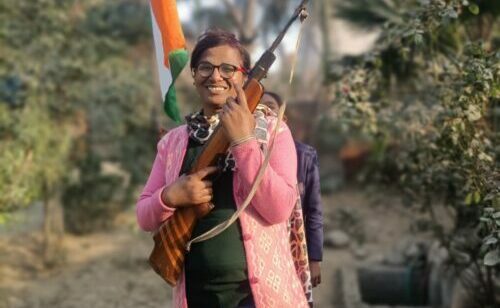
In a quiet corner of Karnal, Haryana, Aditi Sharma runs a small school for underprivileged children. She is the founder, principal, and often, the only teacher. As a transgender woman in North India, her journey has been marked by resistance and isolation — but also by unwavering commitment. Her school may lack formal recognition or resources, but it stands as a space of learning, inclusion, and quiet resilience.
Aditi is not just the founder and principal of Haryana Public School. She is also a transgender woman who dared to imagine a different kind of North India — one where prejudice makes way for possibility, and education belongs to everyone.
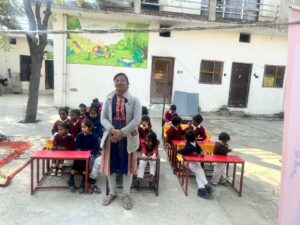
But dreams, she learned early on, come at a cost.
Born and raised in Delhi, Aditi was no stranger to the stereotypes that shadow the transgender community.
“Even educated people carry the assumption that all trans people beg or perform ceremonial rituals. That’s the stereotype I grew up seeing around me,” she says.
It disturbed her and lit the fuse of quiet rebellion.
Leaving Delhi behind, she moved to Karnal with one goal: to build a school not just for visibility, but for children who had nowhere else to go. Her father, unaware she had come out, gave her a 1,200-square-yard plot to build on. “At the time, I hadn’t fully come out. Had they known I was transgender, they wouldn’t have named it to me.”
What she built wasn’t just a school — it was a statement.
In the beginning, there were no teachers, no steady funds, and no blueprint. “I doubted whether I could run a school at all. I had no confidence. But slowly, a few children started coming in. Then a few more. At one point, we had 60–70 students.”
That number dropped, not due to a lack of dedication, but constant harassment. Neighbours let their dogs loose outside. Parents were warned, “Why send your child there? This isn’t a real school.” Some believed her identity disqualified her from leadership, from teaching, from existing with dignity.
She persisted anyway.
Aditi never set out to run a school for underprivileged children. It wasn’t a strategic choice or a targeted mission. It was simply what remained when everyone else walked away. Families who could afford higher fees refused to send their children to a school run by a transgender woman. Teachers quit under social pressure. So she opened her doors to those who had nowhere else to go — children whose families could pay ₹100 a month, sometimes just ₹50, and often nothing at all. “If they don’t learn here, they won’t learn anywhere,” she says. And so she teaches — not because it’s easy, but because no one else will.
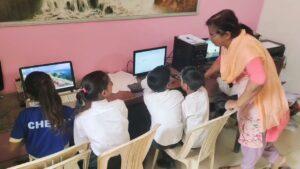
Her day begins at 4 AM — cleaning, prepping, sourcing supplies. By 8 AM, she’s teaching English, guiding students through computing tasks, or painting with them on borrowed desktops. She buys second-hand books herself. There are no permanent staff members. Most teachers leave within weeks. “They say, ‘My family doesn’t want me working here.’ The social pressure is immense.”
Once, a neighbour handed her a one-day-old baby and walked away. Aditi cared for her. When the child fell ill, she spent 12 days at the hospital with her — and the other children. Alone. “They don’t speak to me anymore,” she says of her family. “I’ve learned to let go. If someone doesn’t want to stay in touch, that’s okay. You still have to be happy.”
Haryana Public School is still not recognised by the state government. Despite its large plot, authorities claim she doesn’t meet the criteria. “Other schools on smaller land get recognised,” she says. “But because I’m transgender, they say no.” Her case is currently being reviewed by the Human Rights Commission. Justice Lalit Batra, in a hearing, reportedly said:
“If she doesn’t meet your current rule, change the rule.”
Meanwhile, the children continue to learn — with donated books, basic tools, and the irrepressible will of one woman. Aditi has even built two giant model airplanes — one stretching 20 feet — from scrap and wood. “They don’t fly, but they spark curiosity. Ten children can sit inside. It makes them dream.”
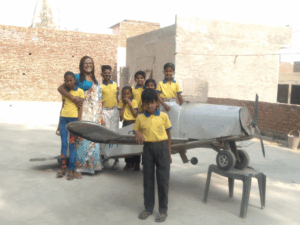
And dreams are something she insists on, even when the world offers no applause. “One child had developmental issues. No school would take him. People told me I was wasting my time. But he deserved a chance.”
Sometimes, appreciation is scarce. Respect even more so. “When parents don’t respect you, neither do their children,” she admits. “When your own life is a constant struggle, it becomes hard to build emotional bonds.”
But she still shows up every day. Reporters ask why so many people visit her school. “Because we’re doing something that shakes the norms,” she tells the children. “This school is special.”
And they believe her. Because children don’t discriminate. Adults do.
Her message to the transgender community is clear:
“Don’t wait for society to accept you. Build your own path. Even if you’re the only one walking it.”
Aditi Sharma may be the only openly transgender woman in North India running a school. But she’s not asking for sympathy. Just space. Just dignity. Just the right to show up — and not disappear.
“Even if only one child comes,” she says,
“I’ll keep the doors open.”
Read the full story in our latest Teacher Warriors issue: https://scoonews.com/magazines/scoonews-june-july-2025-digital-edition/
Education
A Vision Beyond Sight – How Aarti Takawane is Rewriting Futures for Blind Girls
Published
2 days agoon
July 9, 2025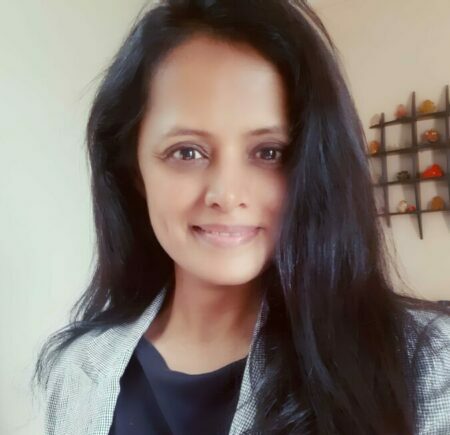
Sometimes, the most extraordinary journeys begin with an ordinary restlessness — that nagging sense that comfort isn’t enough. For Aarti Takawane, that quiet realisation led her to walk away from a secure corporate job, and towards a mission she never imagined for herself.
Aarti’s early career looked like everything most people might aspire to: a steady job, good salary, and the kind of stability that makes parents proud. But deep down, she felt a pull that numbers and meetings just couldn’t satisfy. With a background in psychology and a genuine desire to help others, she always knew her purpose lay in people, not just profit.
That spark turned into a flame when she met Mrs Meera Badve, founder of Niwant, an organisation supporting blind students in higher education. A casual encounter at a social event became a life-changing conversation. Aarti took a leap of faith and began volunteering at Niwant — and for the first time, she felt what it was like to make an impact where it truly mattered.
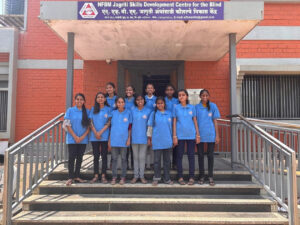
Her path eventually led her to the National Federation of the Blind’s Jagriti School for Blind Girls in Pune — a place that today houses 110 blind girls, 99% of whom come from rural areas. Here, the girls don’t just study; they live, learn, and grow together in an environment that believes in what they can do, rather than what they can’t.
When Aarti joined Jagriti, she began as a psychologist, focusing on the social and emotional development of the girls. But the more she listened to their dreams and struggles, the more she saw the barriers waiting for them after school. “When you give them the right tools, you’re not just giving them a skill — you’re giving them back their choice,” she reflects.
Visually-challenged girls face a stark reality once they step out into the world. Apart from limited government quota jobs in banks or insurance, there were few opportunities that truly matched their abilities. So, Aarti decided to do something about it.
“True empowerment means they can live with dignity, not just survive.”
She founded the Skill Development Centre inside Jagriti School — a space where blind girls could learn practical, job-ready skills that tap into their real strengths. Many of the students have remarkable listening and verbal abilities. So the Centre offers courses that play to these strengths: voice modulation, foreign languages, recruitment training, and more. There are also classes in computer literacy, digital accessibility testing, and even coaching for competitive exams.
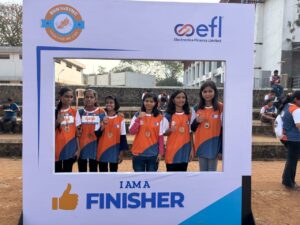
But the real magic lies in how the Centre stays rooted in reality. The team works closely with organisations like Vision-Aid India and inclusive employers to keep training aligned with what the industry actually wants. Each student’s strengths and interests are mapped out with care, so the training feels personal and purposeful.
Equally important is what happens beyond the classroom. Many girls arrive at Jagriti shy, anxious, or unsure of themselves. They may have never used a screen reader, travelled alone, or spoken up in public. So the Centre pairs technical skills with confidence-building: mobility training, decision-making workshops, life skills, and emotional support.
“They didn’t need sympathy — they needed direction, support and opportunity,”
Funding is always a tightrope act — a mix of donations, CSR partnerships, and the occasional government grant keeps the Centre alive. It covers trainer salaries, hostel facilities, assistive technology, and learning materials. The school is committed to full transparency with its supporters, many of whom return year after year because they can see exactly where their help is going.

Aarti knows that none of this would be possible without the right people leading the way. Every teacher or trainer goes through orientation in assistive technology and inclusive education. Sensitisation workshops and regular feedback from students make sure the environment stays supportive and respectful.
As the world changes, so do Aarti’s dreams for the Centre. She hopes to introduce advanced digital modules, remote work training, and a stronger network of inclusive employers. But what excites her most is the chance to rewrite how society sees disability, not as a barrier, but as a different kind of potential waiting to be unlocked.
For the 110 girls who call Jagriti School home, Aarti Takawane is more than just a teacher. She’s proof that sometimes, the best things really do happen by accident — and that true vision is not about what we see, but what we choose to do about what we can’t.
Read the full story in our issue of Teacher Warriors 2025 at https://scoonews.com/magazines/scoonews-june-july-2025-digital-edition/
Education
UP Govt Launches Astro Labs in Government Schools to Boost Scientific Learning
Published
3 days agoon
July 8, 2025
Under the leadership of Chief Minister Yogi Adityanath, the state is rolling out astro labs in government schools at the block level, aiming to strengthen scientific thinking and curiosity among school children, especially in rural areas.
According to a statement issued by the government, these labs—named Amrit Kaal Learning Centres—are being developed through a public-private partnership (PPP) model and are already operational in several districts.
The initiative is designed to give students access to real-time, hands-on learning experiences using tools like Dobsonian telescopes, VR headsets, microscopes, light experiment kits, and anatomical models. These tools go beyond textbook learning, allowing students to explore astronomy, gravity, light, and the physical world through direct experimentation.
Officials say the initiative has already made significant impact. In Ballia district, for example, science labs have been established in all 17 blocks to make science more engaging and inquiry-driven.
Ballia District Magistrate Mangla Prasad Singh said the labs are aligned with the state’s broader goal of making science accessible and meaningful. “These labs are designed to foster experiential and inquiry-based learning,” he noted.
Chief Development Officer Aojaswi Raj added that each lab costs between ₹2.5 to ₹3 lakh, including both the equipment and teacher training. The inclusion of orientation sessions, video guides, and mentorship support for teachers ensures that the labs are used effectively in classrooms.
“These labs have sparked genuine curiosity among children, who now ask questions, observe the night sky, and explore concepts far beyond the standard curriculum,” said Raj.
The program is part of a larger effort to bridge the gap between urban and rural education. With access to advanced tools and teacher support, children in villages are beginning to imagine careers in space science, inspired by stories like that of Indian-origin astronaut Shubhanshu Shukla.
The UP government hopes this initiative will help build a future-ready generation, where aspiration is not defined by geography, and the boundaries of scientific exploration begin right from the classroom.
Education
Class 3 Learning Levels Show Gains Since Pandemic, But Still Below 2017: PARAKH Survey
Published
3 days agoon
July 8, 2025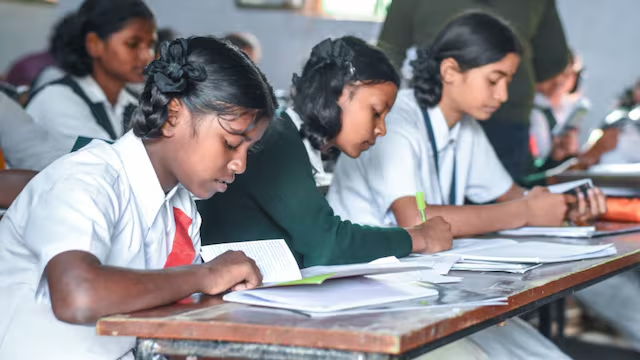
According to the government’s latest PARAKH Rashtriya Sarvekshan report released on Monday, Class 3 students across India have yet to return to pre-COVID academic levels. The survey, conducted in December 2024, covered more than 21 lakh students from Classes 3, 6, and 9 across 74,229 schools, offering a large-scale snapshot of student learning recovery after the pandemic.
Among the three grades, Class 3 is the only one surveyed in all three rounds (2017, 2021, and 2024) — allowing for direct comparison. While there has been an uptick in scores since the 2021 assessment, they remain below the national average recorded in 2017.
In 2024, Class 3 students scored an average of 64% in language, compared to 62% in 2021 — but still lower than 66.7% in 2017. In Mathematics, the score stood at 60%, up from 57% in 2021, but below the 63% recorded in 2017.
Students were found to struggle the most in reading short stories and understanding them (60%), while performing best in everyday language usage (67%). In Maths, the lowest scores came in geometry and money concepts (50%), with the strongest performance in identifying basic shapes and number patterns (69%).
The survey’s structure is aligned with the National Education Policy (NEP) 2020, which breaks school education into four key stages. Class 3 marks the end of the Foundational Stage, making it a crucial checkpoint for basic literacy and numeracy.
Classes 6 and 9: Scores Below 50% in Most Subjects
Students in Classes 6 and 9 showed average scores below 50% in all subjects except language, suggesting that older cohorts may be bearing the brunt of prolonged learning loss from pandemic-related school closures.
A senior official from the Ministry of Education noted that these grades missed nearly two full years of classroom instruction during a critical developmental period. Despite visible recovery since 2021, the learning gaps persist.
Why This Matters
The findings serve as a reminder of the lasting impact of the pandemic on India’s school education, especially for early learners. The report calls for targeted learning interventions, curriculum adjustments, and robust teacher support systems to help students recover foundational skills.
With only limited time before students transition into higher stages of schooling, the emphasis is now on accelerated catch-up strategies and deeper diagnostic assessments to address these persistent gaps.
Education
Design and the Future of Learning: How Architecture is Shaping Next-Gen Schools
Published
3 days agoon
July 8, 2025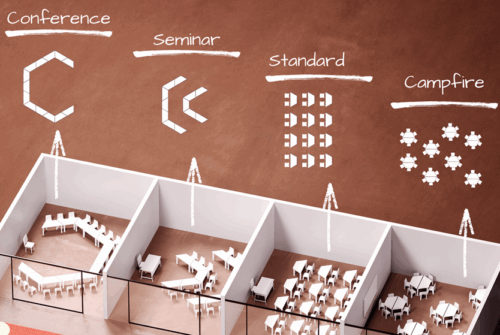
Schools Undergoing Change in India
Schools in India are undergoing a major transformation. Teaching methods are evolving, and schools must meet rising expectations from students, parents, and educators. The National Education Policy (NEP) 2020 has introduced a fresh approach to learning, making it essential for new schools to be designed with these ideas in mind. Older campuses also need thoughtful upgrades and renovations to keep pace.
Schools must adapt to stay relevant in the years ahead. Designing flexible, future-ready spaces is no longer optional, it is vital for creating learning environments that will serve new generations for decades to come.
Experiential Learning
Experiential learning is reshaping education by focusing on hands-on, experience-based learning. It encourages students to take part in activities, real-world problem-solving, and interactive projects that spark curiosity and innovation. Collaboration is central — students work together to tackle challenges, share ideas, and find solutions. This approach deepens understanding and builds teamwork and communication skills needed for future work.
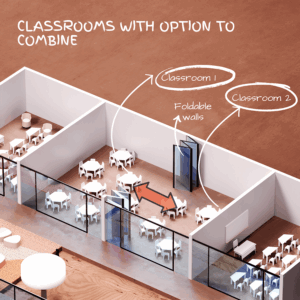
The Importance of Collaboration
Creating spaces that foster experiential learning, enhance engagement, and build critical thinking is essential. Collaborative spaces are a core part of modern school design. They encourage active learning and help students grasp concepts in a deep and meaningful way. By fostering collaboration, schools enable students to develop the skills necessary for success in a rapidly changing world.
Evolving Traditional Classrooms
Traditional classrooms are changing fast. The old rows of desks facing the teacher are giving way to flexible layouts that support different ways of learning. Today’s classrooms can easily switch between standard seating for lectures, conference-style setups for group work, seminar formats for presentations, or campfire circles for open discussions.
Good spatial design plays a big role in building critical thinking and problem-solving skills. A well-designed classroom makes it easy to rearrange furniture for each activity, helping students engage more, think creatively, and learn better together. Studies show students are more motivated and focused in classrooms that adapt to different teaching styles and make learning more interactive.
Spatial Design to Encourage Collaboration
Classrooms with movable furniture allow easy reconfiguration for group work, individual study, or interactive discussions. Flexibility is crucial in modern school design, with modular furniture, movable walls, and multipurpose rooms adapting to different needs. Removing long corridors and creating learning commons with classrooms around them is another innovative approach. Classrooms can open into these commons using sliding or folding partitions, creating a cohesive learning environment. Combining classrooms allows teachers to teach multiple groups together,
building a sense of community.
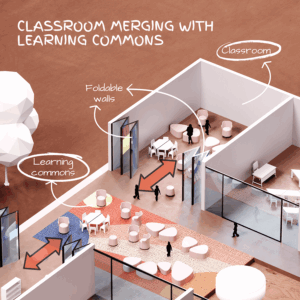
Breakout spaces offer small areas for group discussions, brainstorming, or quiet study, with comfortable seating and whiteboards. Makerspaces equipped with tools and materials foster innovation and hands-on learning by allowing students to apply theory in practice. Outdoor learning areas like gardens or amphitheaters add variety and encourage creativity. Technology-integrated spaces with interactive whiteboards and projectors enhance collaboration by making it easy for students to work together and share ideas. Learning pods provide semi-private spots for group work or individual study. Transparent walls and large windows create openness and bring in natural light, inspiring students to stay engaged.
Designing for well-being & Inclusion
Natural light, vibrant colours, and good acoustics make learning spaces more engaging. Inclusivity is essential so that diverse needs and abilities are accommodated, ensuring all students can succeed. Cross ventilation, thermal comfort, and indoor air quality are equally important — they improve physical comfort and well-being, helping students focus better.
Creativity is also key in effective learning spaces. From preschools to K-12, classrooms should inspire imagination and encourage students to think beyond the ordinary. Thoughtful design elements help create environments where curiosity and innovation thrive.
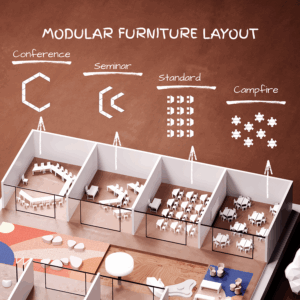
Conclusion
The future of learning will continue to evolve, but well-designed spaces will always play a central role. As educators and designers, we have a unique responsibility to create environments that inspire curiosity, spark ideas, and
support every learner’s journey. By designing schools that are flexible, inclusive, and future-ready, we build not just better classrooms but a stronger foundation for generations to come.
This article is authored by Vinod and Ranju Singhi, the Co-Founders and Principal Architects of BASICS Architects.
Education
Punjab to Introduce Business, Marketing Education in Govt Schools for High Schoolers
Published
4 days agoon
July 7, 2025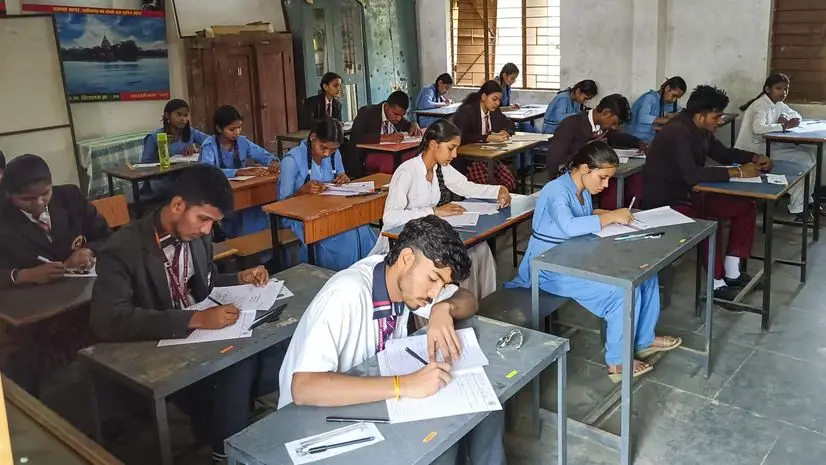
The Punjab government has announced that all Class 11 and 12 students in government schools will receive skill education in business and marketing from the upcoming academic session. The initiative is being implemented under the Punjab Young Entrepreneurs Scheme.
According to Education Minister Harjot Singh Bains, the programme aims to introduce basic entrepreneurship concepts to senior secondary students. As part of this, students will be required to develop and present business ideas as subject-linked projects. The state has also invested in setting up innovation labs in schools to support product development and technical training.
The initiative was formally presented at the Business Blasters Expo 2025, where student teams from various districts showcased business models to a panel of educators, industrialists, and startup professionals. According to official information, participating teams received financial support to take their ideas forward.
Some of the student-led projects included products such as handmade goods, natural cosmetics, customised simulators, framed artwork, and cycle-based mobility solutions. In one case, a student from Mullanpur Dakha created decorative items that were later sold in the market at a significantly higher margin.
The Education Minister also cited employment data between 2014–15 and 2021–22, pointing to a gap between job applicants and job placements. The scheme, he said, is being introduced with the aim of equipping students with skills relevant to today’s economic landscape.
Initially piloted in 30 schools, the Punjab Young Entrepreneurs Scheme is now being scaled across the state. The business and marketing module is expected to cover financial literacy, product development, market analysis, and customer outreach.
The government has stated that the curriculum will align with academic requirements while also supporting practical exposure. Further partnerships with technical institutions and industry stakeholders are also being explored.
Education
Manipur Rallies Call for Disruption-Free Education Amid Ongoing Unrest
Published
4 days agoon
July 7, 2025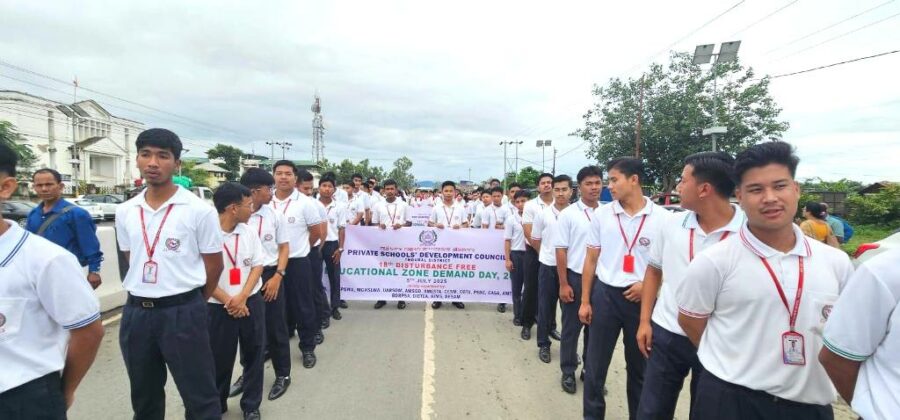
Thousands of voices echoed across the valley districts of Manipur on 5th July, as students, teachers, and civil society members marched in unison, demanding an uninterrupted and safe educational environment. Marking the 18th Disturbance-Free Education Zone Demand Day, the rallies were spearheaded by the Democratic Students’ Alliance of Manipur (DESAM), with support from over 15 civil society organisations.
Held across Imphal East, Imphal West, Kakching, Thoubal, and Bishnupur, the rallies were unified under the message: “Make Education a Disturbance Free Zone.” From THAU Ground near the Legislative Assembly to Imphal College, and similar routes in other districts, demonstrators walked with banners, placards, and resolute slogans calling for peace and protection of learning spaces.
This year’s observance comes at a particularly sensitive moment for the state, as Manipur continues to reel from over two years of ethnic conflict, political instability, and administrative disruptions. These challenges have had a disproportionate impact on the state’s education system—schools in conflict zones have been intermittently closed, exams postponed, and many children displaced from both their homes and classrooms.
Speaking to the media during the rally, DESAM President Mayengbam Somorjit urged the government to pass legislation mandating a minimum of 220 academic days per year, to ensure stability and learning continuity even during crises. He emphasized that children in Manipur must not be deprived of their right to education because of circumstances beyond their control.
Other demands included the appointment of Directors of Education from among experienced educators, and greater transparency in recruitment and promotion processes within the education department. There were also strong appeals to armed groups to abstain from placing financial or material demands on educational institutions—a practice that has led to school closures and security concerns in the past.
The rallies were largely peaceful and drew significant participation from both urban and rural communities. Protesters stressed that beyond political resolution, restoring education must become a humanitarian priority.
In the past two years, students in conflict-affected districts have faced regular school closures, sporadic internet blackouts, and mental health challenges, as families grapple with violence, displacement, and uncertainty. NGOs and local educators have warned of rising dropout rates, learning loss, and a deepening digital divide—especially in remote or vulnerable communities.
While the larger political crisis in Manipur continues to seek resolution, the message from students and educators is clear: education must be safeguarded. As one banner read during the march: “Books, not bullets. Peace, not pauses.”
Education
Tripura CM Launches School Framework, Stresses Social Work in Education
Published
4 days agoon
July 7, 2025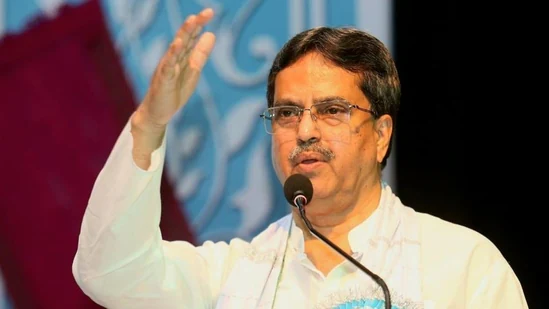
Tripura Chief Minister Dr. Manik Saha on Friday launched the ‘Tripura School Quality Assessment and Accreditation Framework (TSQAAF),’ a state-level mechanism aimed at standardising and evaluating school performance to align with national quality benchmarks.
Speaking at the launch event at Rabindra Shatabarshiki Bhavan in Agartala, Dr. Saha, who also holds the Education portfolio, emphasised that while academic knowledge is essential, it must be accompanied by values, social awareness, and holistic development.
“Textbook education can never be the standard of life,” the Chief Minister stated, adding, “Along with education, children should also be engaged in social work.”
The TSQAAF is expected to serve as an evaluative framework that not only sets indicators for school infrastructure, teaching practices, and learning outcomes but also focuses on co-curricular and value-based education. According to officials, the framework will allow schools across Tripura to be assessed, accredited, and guided for improvement on measurable parameters of quality.
Saha acknowledged that the state education department is adapting to the evolving needs of learners and aligning with national initiatives like the National Education Policy (NEP) 2020. He highlighted the importance of uniformity in curriculum and assessment to ensure students across India are prepared for central-level competition.
“If there is a uniform question paper, our children can also compete centrally,” he said.
The CM also spoke about the broader responsibilities of teachers in shaping character, ethics, and social consciousness among students. He encouraged the inclusion of practical subjects that address social problems and life skills, going beyond syllabus-bound instruction.
Reaffirming the state’s commitment to education reforms, Saha said quality teachers are being recruited through the Teacher Eligibility Test (TET), and more appointments are planned to strengthen the system further.
Senior officials, including Special Secretary of the Education Department Raval Hemendra Kumar, Director of Education N C Sharma, and SBI Foundation CEO Sanjay Prakash, were present at the event. The SBI Foundation has also extended support to the state’s education initiatives.
The TSQAAF initiative marks another step in Tripura’s education reform roadmap, aimed at creating a comprehensive schooling environment that prepares students for academic success while also cultivating civic responsibility.
Education
“We Sleep on Walls Here”: Shubhanshu Shukla Talks to Indian Students from Space
Published
6 days agoon
July 4, 2025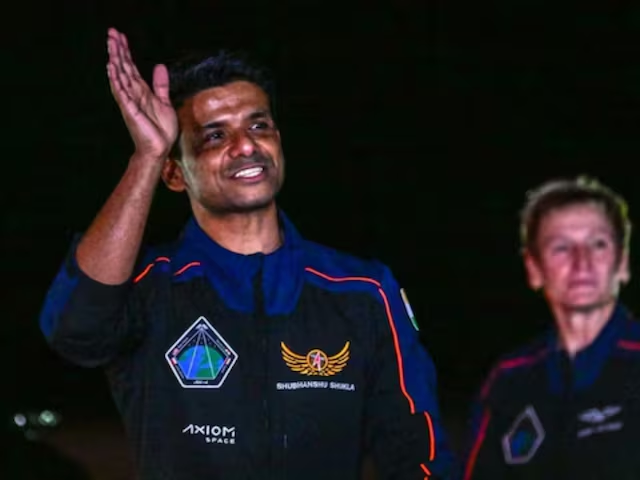
Astronaut Shubhanshu Shukla, currently stationed aboard the International Space Station (ISS), answered questions from schoolchildren during a live interaction hosted under ISRO’s Vidyarthi Samvad Program.
The session, designed to bring students closer to the realities of space science, turned into a heartwarming and humorous conversation about food, sleep, and the sheer wonder of viewing Earth from space.
When asked how astronauts sleep in zero gravity, Shukla smiled and explained: “There is no floor or ceiling in space. Some of us sleep on the wall, some on the ceiling. We have to tie ourselves down so we don’t float away while sleeping.”
The conversation became sweeter when Shukla revealed that he brought familiar Indian flavours with him into orbit. “I have carried gajar ka halwa, moong dal halwa, and mango juice with me from India,” he said, to the delight of the young audience. He clarified that the halwa was specially medicated for space missions, not made at home — a detail that sparked laughter and curiosity alike.
The astronaut also spoke about daily life aboard the ISS, including how exercise is essential to counter microgravity. “We ride bicycles here, but there are no seats. We strap ourselves in with belts,” he told the children, who were both fascinated and amused by the image.
For Shukla, however, the highlight of being in space remains the view of Earth. “That blue sphere, that light mist… seeing Earth from here is the most beautiful experience. It’s hard to describe in words.”
Addressing mental well-being, he shared how astronauts stay connected with their families. “Technology helps bridge the distance. We can talk to our loved ones, and that keeps us grounded — even when we’re not.”
Also present during the interaction was Group Captain Angad Pratap, a fellow member of the Gaganyaan mission crew, who encouraged students to consider careers in aviation and space science.
For many students, the session was a dream come true. “It felt like science fiction,” said one participant. “Now I believe I can go to space one day.”
As India continues its rapid progress in space exploration, conversations like these serve as reminders that inspiration is as critical as infrastructure — and that sometimes, a simple chat with an astronaut can launch the imagination of an entire generation.
Newsletter

Less Than Half of Indian Schools Offer Skill-Based Courses for Senior Students: NCERT Survey

The Woman Who Refused to Disappear – Aditi Sharma’s Quiet Fight for Education

A Vision Beyond Sight – How Aarti Takawane is Rewriting Futures for Blind Girls

UP Govt Launches Astro Labs in Government Schools to Boost Scientific Learning

Class 3 Learning Levels Show Gains Since Pandemic, But Still Below 2017: PARAKH Survey

Design and the Future of Learning: How Architecture is Shaping Next-Gen Schools

Punjab to Introduce Business, Marketing Education in Govt Schools for High Schoolers

Manipur Rallies Call for Disruption-Free Education Amid Ongoing Unrest

Tripura CM Launches School Framework, Stresses Social Work in Education

“We Sleep on Walls Here”: Shubhanshu Shukla Talks to Indian Students from Space

A Structural Proposal to Transform School Education in Bihar

NIIT Foundation and YuWaah, UNICEF Launch Free Online Digital Marketing Course for Youth

National Conference Pushes for Common Standards Across School Boards

Maharashtra: Over 8,000 Villages Lack Schools, CCTV Compliance Still Patchy

Haryana to Offer Free After-School Coaching for JEE, NDA Aspirants

Telangana CM Calls for Overhaul of Intermediate Education in Telangana

Indian Astronaut Shubhanshu Shukla to Connect with School Students Live from Space

Are 4-Year Degrees Dead? Nikhil Kamath and the WEF Say Lifelong Learning Is Here to Stay

UGC Cracks Down on 89 Institutes Over Anti-Ragging Failures

Government Doubles Down on Coaching Centres: New Panel Signals Stronger Regulation Ahead

CBSE To Conduct Board Exams Twice for Class 10 from 2026

How to Win Back Wandering Minds: Post-Summer Edition
Tripura Becomes Third Indian State to Achieve Full Literacy

Assam Brings Sign Language to Senior Secondary Classrooms in Landmark Move

Delhi Schools to Implement Age 6 Rule for Class 1 Admissions from 2026

Is Your School Following These Mandatory CBSE Committees?

CBSE’s ‘Sugar Boards’ Initiative: Tackling the Sweet Crisis in Indian Schools

Maharashtra to Regulate Pre-Primary Education with New Law Aligned to NEP 2020

MAHAJYOTI’s Book Distribution Scheme to Empower 7,000 OBC Students Preparing for JEE/NEET & MHT-CET

China Embarks on Ambitious AI-Driven Education Reform to Build a ‘Strong Education Nation’ by 2035

John King’s Book ‘Teacher By Teacher’: A Global Tribute to the Transformative Power of Education

CBSE Introduces Mandatory Bridge Course for Classes 6 to 12 in Chhattisgarh Under NEP 2020

Rewriting Ambedkar: Why Students Must Know the Man Beyond the Constitution

CBSE Mandates 50-Hour Annual Training for Teachers, Declares STEM as 2025 Theme

Banu Mushtaq’s International Booker Win Is a Wake-Up Call for Indian Schools to Reclaim Literature

India Bids Farewell to NEP Architect Dr K. Kasturirangan

Pradhan Mantri Rashtriya Bal Puraskar 2025: Nominations Now Open for India’s Young Achievers

NCERT Class 7 Textbooks Updated: Mughals Removed, Focus on Indian Ethos and Pilgrimage

Delhi Government Cracks Down on Dummy Schooling; Over 600 Schools Inspected, 10 Issued Notices

Delhi Approves Landmark Bill to Regulate School Fees Across 1,677 Institutions

Operation Sindoor and Operation Abhyaas: Navigating School Safety and Student Well-being Amid Rising Tensions

Harvard Stands Its Ground: Harvard Faces ₹18,400 Crore Funding Freeze After Rejecting Trump Administration’s Demands

CUET-UG 2025 Likely to be Postponed, Fresh Dates Expected Soon

Aalamaram 2025: Where Indian Educators Came Together to Grow, Reflect, and Lead

Trump Signs Executive Order to Promote AI Integration in U.S. K-12 Education

Mizoram Declared First Fully Literate State in India

Indian Students Flock to Singapore, Ireland, and Dubai for Higher Studies: 38% Surge Recorded

OpenAI Academy Launches in India to Democratise AI Education for Students, Teachers, and Startups

UK’s New Immigration Rules: What They Mean for Indian Students

Private School Fees Surge by 50–80% in Three Years, National Survey Finds
SGEF2023 | Special Address by Rama Datt, Trustee, Maharaja Sawai Man Singh II Trust, Jaipur

ScooNews | After Movie | ScooNews Global Educators Fest 2023

Aftermovie | NIES2 UP Chapter | 21 Jan 2023

WEBINAR | Gamification in Education: How Digital Badges Can Boost Student Motivation and Engagement

ScooNews | WEBINAR| Importance of Physical Activity for Children at School | Plaeto

SCOONEWS | WEBINAR | WHY DIGITIZING YOUR SCHOOL IS A MUST | TEACHMINT

Keynote Address | Lakshyaraj Singh Mewar

Anurag Tripathi, Secretary, CBSE at SGEF2022

How schools can nurture every student’s genius

Aftermovie | SGEF2022 | Jaipur

Li Andersson | Minister of Education | Finland

Anurag Tripathi, Secretary, Central Board of Secondary Education (CBSE) discusses NEP2020

ScooNews | Early Ed Asia 2019 | Aftermovie
#PodarECEconf : Pursuing quality ECE

#CBSE Class XII #Results #Highlights

The interesting story of India’s educational system | Adhitya Iyer

A young scientist’s quest for clean water

The Danger of Silence: Clint Smith

National Digital Library of India is an initiative by HRD Ministry

Remembering Kalpana Chawla on her birthday!

Message from Sadhguru for Students!
Message from Sadhguru for Students!

The Untapped Genius That Could Change Science for the Better

Eddy Zhong: How school makes kids less intelligent TEDxYouth@Beacon

#TEDxCanberra : What if every child had access to music education…
Trending
-
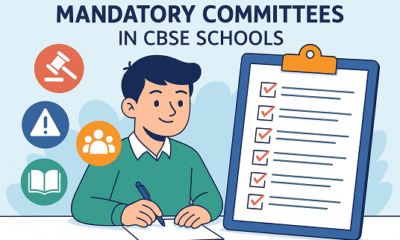
 Education3 months ago
Education3 months agoIs Your School Following These Mandatory CBSE Committees?
-

 Education2 months ago
Education2 months agoCBSE’s ‘Sugar Boards’ Initiative: Tackling the Sweet Crisis in Indian Schools
-
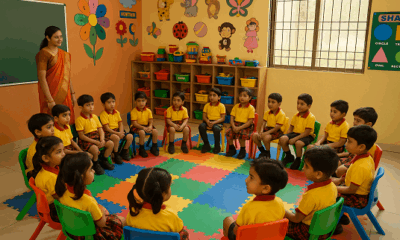
 Education3 months ago
Education3 months agoMaharashtra to Regulate Pre-Primary Education with New Law Aligned to NEP 2020
-
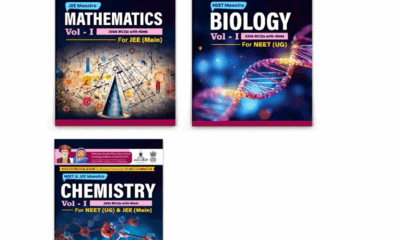
 Education3 months ago
Education3 months agoMAHAJYOTI’s Book Distribution Scheme to Empower 7,000 OBC Students Preparing for JEE/NEET & MHT-CET
-
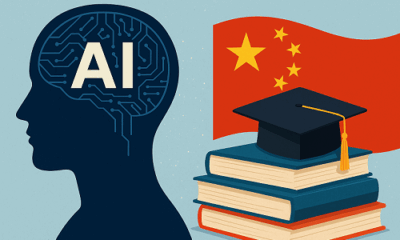
 Education3 months ago
Education3 months agoChina Embarks on Ambitious AI-Driven Education Reform to Build a ‘Strong Education Nation’ by 2035
-
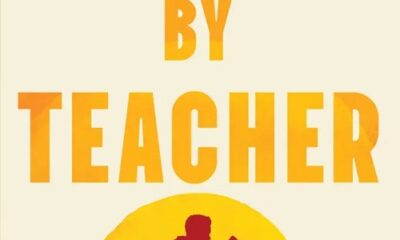
 Education2 months ago
Education2 months agoJohn King’s Book ‘Teacher By Teacher’: A Global Tribute to the Transformative Power of Education
-
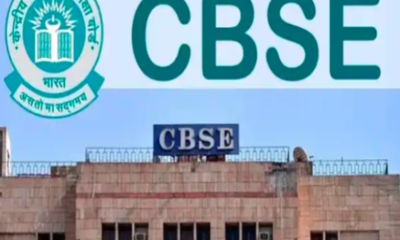
 Education3 months ago
Education3 months agoCBSE Introduces Mandatory Bridge Course for Classes 6 to 12 in Chhattisgarh Under NEP 2020
-
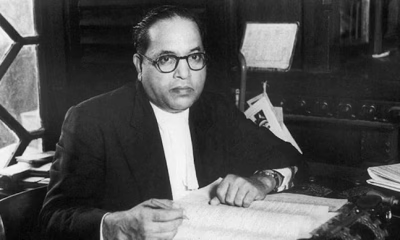
 Education3 months ago
Education3 months agoRewriting Ambedkar: Why Students Must Know the Man Beyond the Constitution
-
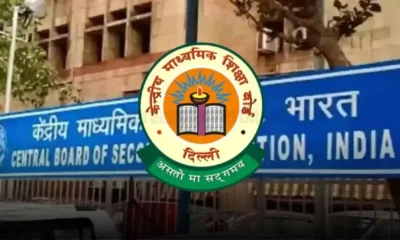
 Education3 months ago
Education3 months agoCBSE Mandates 50-Hour Annual Training for Teachers, Declares STEM as 2025 Theme
-
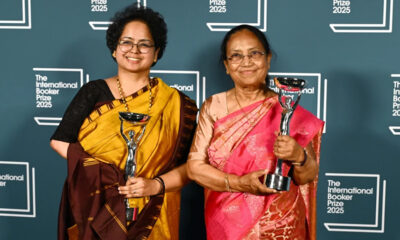
 Education2 months ago
Education2 months agoBanu Mushtaq’s International Booker Win Is a Wake-Up Call for Indian Schools to Reclaim Literature




